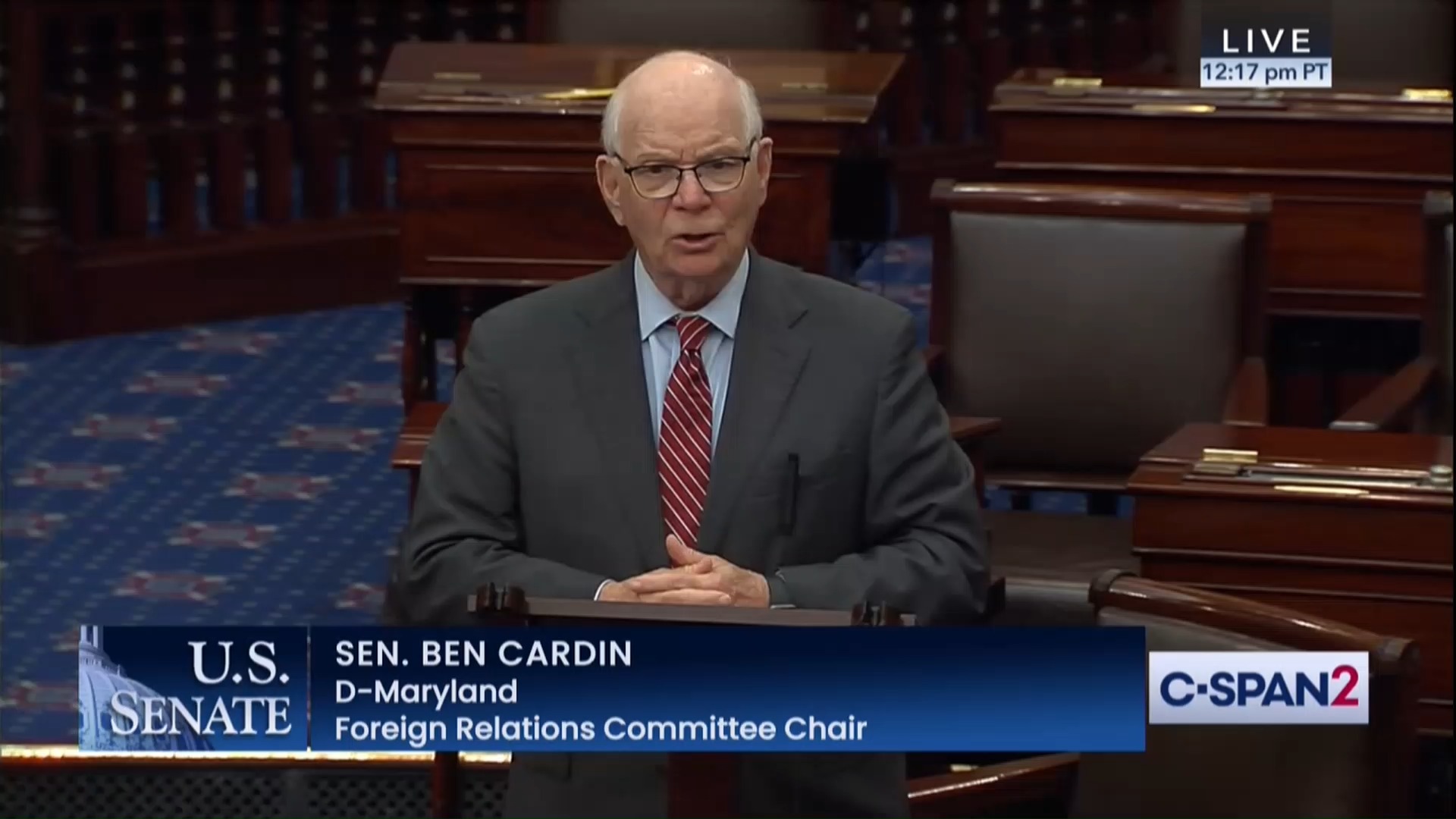Chair Cardin Renews Calls for U.S. and International Action to End Sudan War
WASHINGTON – Today, U.S. Senator Ben Cardin (D-Md.), Chair of the Senate Foreign Relations Committee, delivered a speech on the Senate floor to once again bring needed attention to the ongoing conflict and tragic humanitarian crisis in Sudan, calling on all parties to come to an agreement for an immediate ceasefire to usher in lifesaving humanitarian aid.
“The Sudanese people want to live in peace and security and prosperity,” said Chair Cardin. “I urge all those who fight for justice, for those who fight against atrocities, for those who fight against famine – let us come together with the Sudanese people, and after decades of war, let us end this conflict once and for all.”
WATCH THE CHAIR'S REMARKS HERE
A copy of the Chair’s remarks, as delivered, have been provided below.
Mr. President, I come here to the floor today to once again call attention to the ongoing conflict in Sudan. Our presiding officer knows about this conflict very well. It's one of the most tragic circumstances that we have anywhere in the world. The humanitarian crisis is beyond description. The ethnic cleansing and tragedies of two factions at war has made this a living hell for so many people in that region. And after more than a year of brutal violence, the two sides may come together soon to talk. We certainly hope that's the case. This is a critical first step to ending the fighting that erupted last year in a country that has seen decades of war.
I want to acknowledge the Biden-Harris Administration and Special Envoy Tom Perriello for their work in Sudan. It was not easy to get here, and I hope the effort to launch a dialogue this month is successful. Despite the best efforts of this administration, the violence and humanitarian crisis continues and the international community is falling willfully short. While we wait for talks to begin, civilians on the ground are being killed, abused, and forced out of their homes. Nearly 11 million people have been displaced; half the population – close to 26 million – face crisis levels of starvation; 750,000 people are on the brink of starvation; and according to one published report, 2.5 million more people will die because of the conditions related to the conflict and the use of food as a weapon of war. Credible human rights organizations claim that genocide has once again occurred in Darfur. I remember Darfur, we said “never again.” It's happening again in Darfur. But there are no clear U.S. or United Nations plans to ensure humanitarian access across borders or across military lines.
Mr. President, as the Chair of the Senate Foreign Relations Committee, I come to the floor to say we need to take urgent action now. We need to work with our partners and allies to pressure the parties to agree to an immediate ceasefire and for both sides to make it stick this time. To its credit, the Biden-Harris Administration has imposed sanctions on a variety of actors, including at the senior levels of both warring parties. But our partners and allies have not followed suit. In fact, just this week, The Centry released an analysis of the multilateral sanctions regime and found that the European Union, in particular, has lagged behind in its implementation.
It's time – it's past time to do more. It's time for our allies to prioritize these measures so we are speaking with one voice to the warring parties. We need also to work urgently with our African and European partners to devise concrete measures the international community can take to protect the civilians from a repeat of last year's mass atrocities. And we need to focus on the next phase – creating and protecting space for the Sudanese civilians, to establish a path to a peaceful democratic transition and accountability for those responsible for the atrocities and contravention of international humanitarian law, including unspeakable acts of sexual violence and systematic use of starvation as a weapon war.
We should not let them get away with their corrupt schemes that pillage the Sudanese people's resources. We should not let them extinguish Sudan's transition to democracy. That means taking steps against those actors who supply or facilitate arms and military materiel to any side in Sudan. It means enforcing the existing United Nations arms embargo and pushing for its extension to cover all of Sudan, so that neither side responsible for the violence is protected or immune. And it means working collectively through the United Nations and other multilateral institutions to support these efforts. And it means that the international community and the United Nations must pursue any and all means to deliver humanitarian assistance into the hands of the Sudanese people and ensure robust funding for a humanitarian response, as the situation demands. Sierra Leone is taking up the presidency of the Security Council. It is imperative that we work together on action plans to protect civilians, on support for coordinated peace negotiations, on initiatives to end the impasse of humanitarian access, and on accountability.
Mr. President, I have said this before, but every life is precious. The Sudanese people want to live in peace and security and prosperity. And so I urge all those who fight for justice, for those who fight against atrocities, for those who fight against famine – let us come together with the Sudanese people, and after decades of war, let us end this conflict once and for all.
###
